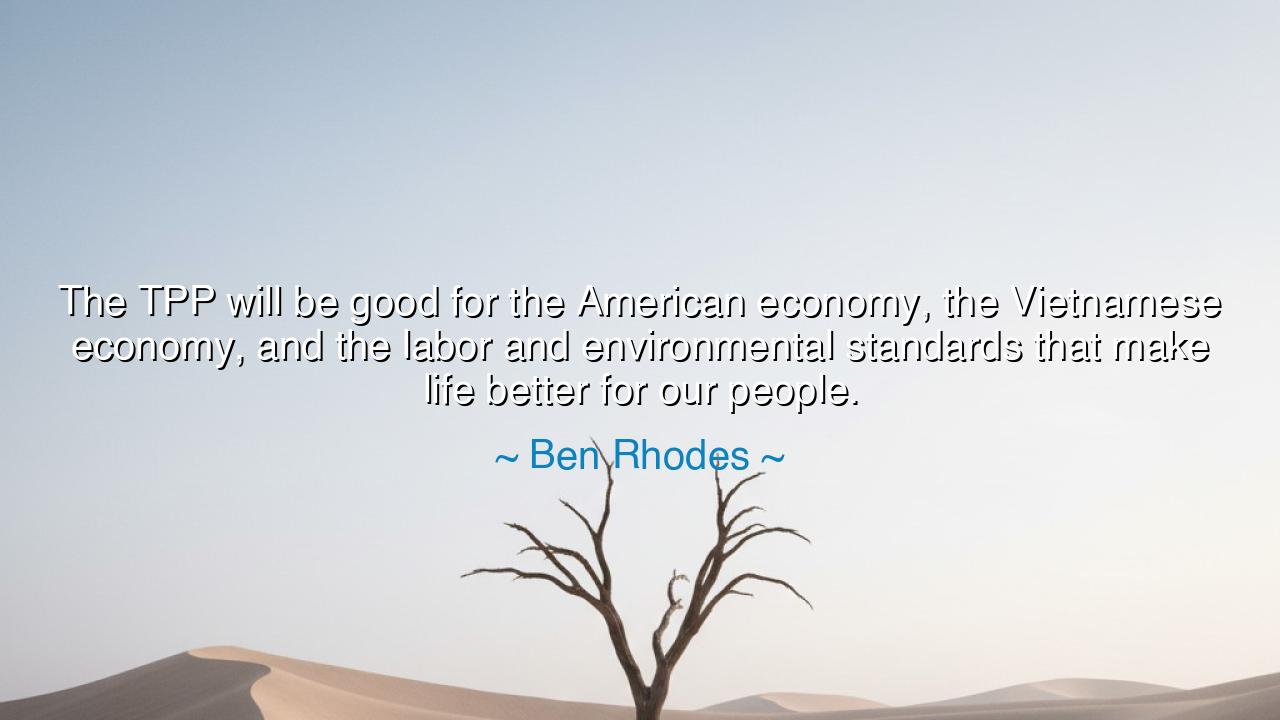
The TPP will be good for the American economy, the Vietnamese
The TPP will be good for the American economy, the Vietnamese economy, and the labor and environmental standards that make life better for our people.






Hear the words of Ben Rhodes, counselor of nations in the days when commerce and diplomacy sought new forms: “The TPP will be good for the American economy, the Vietnamese economy, and the labor and environmental standards that make life better for our people.” This utterance was not idle praise of trade, but the vision of one who believed that agreements among nations could shape not only markets but also the dignity of workers and the health of the earth. It is both promise and challenge, for in these words we see the eternal hope that treaties may bind nations together in prosperity, rather than divide them in conflict.
The meaning lies in the threefold blessing Rhodes proclaimed: prosperity for the American economy, prosperity for the Vietnamese economy, and the raising of standards for labor and the environment. Trade agreements have too often been judged only by the wealth they produce, neglecting the people who toil and the land that suffers under industry’s weight. But Rhodes declared that the TPP—the Trans-Pacific Partnership—should be more than profit. It should be a covenant, lifting up the poor, guarding the earth, and weaving bonds of mutual benefit between East and West.
The origin of this quote rests in the struggles of the early twenty-first century, when globalization had bound nations tightly but unequally. The United States, seeking both influence and growth, looked to Asia, where economies like Vietnam’s were rising swiftly. The TPP was envisioned as a vast trade pact, not merely lowering tariffs but also compelling participants to honor stronger protections for workers and stricter safeguards for the environment. Rhodes spoke these words as advocate for the agreement, believing it could be a model for trade with justice.
History gives us many tales of trade untempered by justice, and the suffering it brings. Recall the triangular trade of centuries past, where wealth flowed to Europe but was built upon the backs of enslaved Africans and the plunder of colonies. Such commerce enriched a few but broke the spirits of millions. Contrast this with the Marshall Plan after the Second World War, where economic aid was given not to exploit but to rebuild, binding former enemies into allies. Here we see the lesson: trade can either deepen chains or forge peace, depending on whether it honors not only profit but people.
Thus Rhodes’ words must be heard as a summons to higher vision: that labor standards matter as much as trade balances, and that environmental protections are not obstacles to growth but foundations for lasting prosperity. For what good is wealth if the worker is broken? What good is growth if the rivers run black and the skies choke with smoke? A treaty that serves both people and planet is not merely a contract—it is a step toward civilization’s maturity.
The lesson is clear: when evaluating alliances and agreements, ask not only, “What do we gain?” but also, “Who is lifted? Who is protected? What endures for our children?” For the wealth of nations must be measured not by numbers alone, but by the strength of their workers and the purity of their lands. True prosperity is not fleeting profit, but flourishing that endures through generations.
What then must we do? As citizens, demand that your leaders uphold fairness in trade. Support goods and companies that honor labor and environmental standards, rather than those that exploit the poor or ravage the earth. As nations, remember that cooperation across borders need not weaken sovereignty but can strengthen humanity itself. Let every treaty be judged not by how much it fattens the purse, but by how much it enriches the lives of people and the health of the world.
So remember Ben Rhodes’ words: “The TPP will be good for the American economy, the Vietnamese economy, and the labor and environmental standards that make life better for our people.” Whether or not the TPP endured, the vision within it remains timeless. For the future belongs not to the rich who hoard, nor to the reckless who plunder, but to those who understand that prosperity, justice, and stewardship must walk together, hand in hand.






AAdministratorAdministrator
Welcome, honored guests. Please leave a comment, we will respond soon